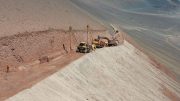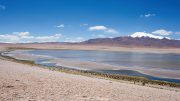When Chile’s left-wing president-elect Gabriel Boric (pronounced Bo-rich) takes office on March 11, the 35-year-old will be the youngest president in the country’s history and as the editorial board of the conservative Wall Street Journal noted, will be “the most leftist politician to win in Chile since Salavador Allende in the 1970s.”
Boric’s 56% to 44% victory over right-wing rival Jose Antonio Kast, marks a number of other ‘firsts’. The former student activist is the first “to come from outside the centrist political mainstream that has largely ruled Chile since its return to democracy in 1990,” writes Lucinda Elliott of the Financial Times, “and the first to secure a second-round victory after losing the first.” Voter turnout — at nearly 56% — was also “the highest of any presidential race since voting became voluntary in 2012,” Elliott calculated, while the New York Times pointed out that Boric received “the highest number of votes in a presidential contest in the nation’s history.”
On December 30, U.S. President Joseph R. Biden Jr. called Boric to congratulate him on his December 19 election win, and “applauded Chile’s free and fair elections as a powerful example to the region and the world,” Press Secretary Jan Pesaki said in a statement. “The two leaders discussed their shared commitment to social justice, democracy, human rights and inclusive growth,” and President Biden “underscored the importance of U.S.-Chile cooperation to promote a green and equitable recovery from the Covid-19 pandemic and to address the existential threat posed by climate change.”
Biden knows all too well — as do most other world leaders — how important Chile is to a greener future. The South American nation is the world’s biggest copper producer and has some of the world’s largest lithium resources. S&P Global Market Intelligence recently estimated that Chile will produce about 26.7% of the world’s mined copper and about 32% of its lithium chemical supply in 2021. Both are critical to the green energy transition.
During his campaign, Boric, who is backed by a broad left-wing coalition that includes the Communist Party, moderated some of his positions to attract centrists, but his basic platform remained the same. He wants a greater distribution of wealth. Roughly 25% of the country’s wealth is owned by 1% of the population, according to the United Nations, making income inequality in the country the highest in the OECD, based on 2020 data.
That was one of the reasons he played a key role in student protests in 2011 that demanded tuition wavers for poor students; and why he later supported mass protests sparked by a hike in subway fares in October 2019, but which snowballed into anger over high living costs, inadequate pensions and poor public hospitals and schools. The government called in armed forces and at least 30 people died — in addition to the scores of others blinded by rubber bullets. It was a defining moment. In November 2019, President Sebastian Pinera, a conservative billionaire, agreed to a referendum on writing a new constitution, which is now being written by members of a Constitutional Convention, elected by the public.
Boric and his supporters want to break with some of the free-market economic models of the past. “If Chile was the cradle of neoliberalism it will also be its grave,” the politician declared during his campaign. He wants to overhaul the country’s private pension system and improve social services. He has called for higher taxes, increases in government spending on public healthcare and education, and lower transportation costs. He advocates raising the minimum wage and shortening the work week. He also wants to back reforms that will improve the rights of women, indigenous communities and minorities. He champions the fight against climate change, wants to increase renewable energy, and has big plans to protect the environment.
In his victory speech, Boric vowed that the controversial Dominga project, a proposed copper and iron mine owned by Andes Iron, a private Chilean company, would not go ahead due to environmental concerns. The project, about 500 km north of Santiago, is near ecological reserves. “We don’t want more projects that destroy Chile,” Boric said.
Views on what his presidency may bring are mixed. “The policies of Boric carry an element of risk, a very significant increase in taxation and spending and tighter regulation,” Alberto Ramos, a Goldman Sachs economist familiar with Chile, was quoted as saying in a Wall Street Journal article on December 20. Others, like analysts at Stratfor Worldview, part of Stratfor Corp., an American geopolitics publisher and consultancy, say the election results could impact Chile’s business climate. “Pledges to increase taxes on both wealthy Chileans and the country’s mining sector will likely weaken Chile’s position in international markets, which have up until now favourably viewed the country’s economic trajectory. Economic risks — including the potential for downgraded credit rating, a weaker Chilean peso and/or a capital flight spike — will increase, especially if the government implements anti-business policies.”
Stratfor, part of Rane, a risk intelligence company, also noted that Boric “is likely to receive support among the center leftists to increase taxes and tariffs on Chile’s mining sector, potentially severely cutting into profits for global mining companies and decreasing investment in the sector, which is the backbone of the Chilean economy.” (Roughly 10% of the country’s GDP comes from mining, according to the U.S. International Trade Administration.)
But others reason that Boric’s agenda will meet headwinds in a divided national Congress. He also has to deal with an economy hit hard by the pandemic, and at the same time not alienate his base. “He’s going to have to choose between going moderate or being radical,” Patricio Navia, a politics professor at Chile’s Diego Portales University, told the New York Times. “Whatever he chooses, it’s going to alienate many voters.”
Boric is the first to recognize the challenges ahead. “I will be the president of all Chileans,” he pledged in his victory speech. Time will tell if he can pull off that promise.






Be the first to comment on "The voice of a new generation in Chile"